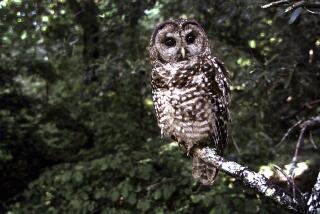Outdoor Notes : Lead Shot Outlawed in Waterfowl Hunting Areas, Starting in 1991
- Share via
The U.S. Fish and Wildlife Service has announced that it plans to ban lead shot in federal waterfowl hunting areas throughout the country, starting in 1991.
The service is being sued by the National Wildlife Federation, the nation’s largest conservation organization, which seeks a nationwide lead shot ban in 1987. Preliminary arguments in the suit are scheduled to begin today in U.S. District Court at Sacramento.
Both sides said that negotiations for an out-of-court settlement of the long controversy broke down Wednesday night.
The federation, the U.S. Fish and Wildlife Service and many other conservation organizations maintain that spent lead shot in waterfowl areas is responsible for the lead poisoning deaths of bald eagles and waterfowl. Estimates of waterfowl deaths related to lead poisoning range up to 2 million ducks a year. Service biologists say they know of 114 bald eagles killed since 1980 from eating birds carrying lead shot in their bodies.
Some hunting groups maintain that large-scale lead poisoning deaths of bald eagles and waterfowl are unproven, and that converting to less-dense steel shot would result in the crippling of far more waterfowl than is the case when lead shot is used.
The federation contends in its suit that the Endangered Species Act, the Migratory Bird Treaty Act and the Bald and Golden Eagle Protection Act all require that lead shot be banned in the lower 48 states, and that it can be ended by the 1987-88 hunting seasons.
The government’s proposal for the lower 48 calls for a ban in 1987 in areas where waterfowl harvests exceed 20 birds per square mile during the hunting season. Each year more areas would be covered until 1991-92, when the ban would reach areas with harvests below five birds per square mile.
Alaska, where eagles are not endangered, would be exempt from the schedule but would still have to convert to steel shot by 1991.
Department of Fish and Game warden Carol Thompson reminds Salton Sea fishermen that an ocean sportfishing license isn’t applicable to the Salton Sea, where a general fishing license is required. Thompson said she has cited more than a dozen fishermen at the sea this month who had only ocean licenses.
“It’s the No. 1 violation at the sea presently and the confusion seems to be a misunderstanding in terms,” Thompson said. She added that many license agents in Los Angeles, Orange and San Diego counties mistakenly believe only an ocean license is required at the sea.
Briefly
Don Williams of Ceres, Calif., caught a 12-pound 13-ounce largemouth bass at the recent Red Man pro bass tournament at Clear Lake, Calif., which earned him $1,000 and tied a 13-year-old Bass Anglers Sportsman’s Society record for the largest bass caught in a BASS tournament. The big bass also helped Williams win the tournament and a first-place check of $1,810. . . . Wyoming biologists report that grizzly bear incidents there this spring were unusually low and attribute the ursine inactivity to an unusually wet, cool spring, which provided good bear forage in remote areas. . . . A Utah game warden recently saw a rare river otter in Morgan County, which expands the areas where the otters are known to exist. . . . David Carradine and Bill Walton are scheduled to participate in a Muscular Dystrophy Assn. celebrity trapshoot July 12 at Prado Tiro in Chino, the Olympic shooting site. . . . The OP Pro Surfing Championships Aug. 26-31 at Huntington Beach will be an “AA” rated event by the Assn. of Surfing Professionals.
More to Read
Sign up for Essential California
The most important California stories and recommendations in your inbox every morning.
You may occasionally receive promotional content from the Los Angeles Times.













